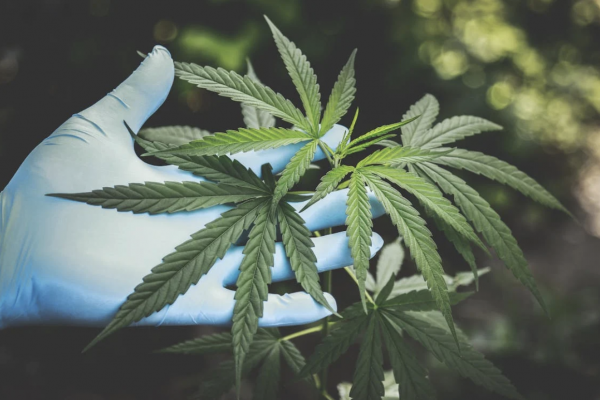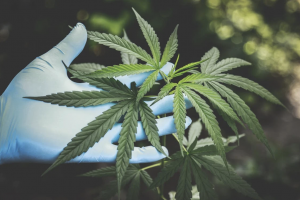Sponsored Message
Can Medicinal Cannabis Impact Your Nutrition Goals?

Image credit: https://www.pexels.com/photo/person-holding-green-canabis-2178565/
Can Medicinal Cannabis Impact Your Nutrition Goals?
Many people struggle with maintaining healthy eating patterns. Recent research shows medicinal cannabis may influence appetite, metabolism, and eating behaviors in ways that support nutritional goals. Different cannabis compounds interact with the body’s systems uniquely, requiring informed decision-making.
Cannabis and Appetite: Understanding the Mechanisms
The endocannabinoid system regulates appetite and metabolism. THC stimulates appetite by activating CB1 receptors, increasing food intake and altering taste perception. In contrast, CBD may reduce appetite by weakly blocking these receptors. THCV can suppress appetite by actively blocking CB1 receptors, working similarly to pharmaceutical suppressants.
These diverse effects mean that different strains support different dietary goals. Beyond appetite, cannabis affects metabolism—impacting fat storage, energy use, and insulin sensitivity. This may explain why some cannabis users have lower BMIs despite increased short-term calorie intake.
Understanding these interactions helps guide the effective use of medicinal cannabis for nutrition and wellness.
Weight Management Applications
Medicinal cannabis may support both weight gain and weight loss, depending on the compounds and strains used. THC-dominant strains can stimulate appetite and aid weight gain, especially in patients with medical conditions like HIV/AIDS. Studies show modest weight increases with therapeutic cannabis use.
For weight loss, THCV-containing strains may suppress appetite and boost energy use. CBD’s anti-inflammatory effects could support metabolic health during weight loss efforts. Cannabis users often have lower body weights, possibly due to CB1 receptor downregulation with long-term use.
While this suggests controlled cannabis use might aid weight maintenance, strong evidence for significant weight loss is limited, and effects vary by individual.
Successful weight management with cannabis requires careful strain selection, timing of consumption, and coordination with healthy lifestyle practices. Professional guidance ensures optimal outcomes while minimizing potential adverse effects.
Nutritional Considerations and Diet Quality
Cannabis use can affect diet quality and nutrition. Chronic users often eat more high-calorie foods and carbs, lowering overall diet scores. While it may boost appetite, it doesn’t always encourage healthy eating.
Cannabis also alters taste and smell, which can change food preferences and impact adherence to diets.
Strategic use before meals may help with appetite, but unplanned use can lead to unhealthy snacking. For those with deficiencies, cannabis may aid nutrient intake if paired with a balanced diet—but it shouldn’t replace healthy eating habits.
Strain Selection for Dietary Goals
Cannabis strains vary in cannabinoid ratios, supporting different nutrition goals. THC-dominant strains with moderate CBD boost appetite and aid weight gain when used before meals.
For weight loss, CBD-dominant or THCV strains may curb appetite and support metabolism. Balanced THC:CBD ratios offer control with benefits.
Terpenes also affect appetite and mood, influencing food choices. Edibles give long-lasting effects, while inhalation offers quick control. Proper timing and dosing are essential.
Professional Guidance and Implementation
Using medicinal cannabis in nutrition plans needs professional guidance for safety and effectiveness. Healthcare providers can recommend the right strains, doses, and timing based on individual health and goals, especially for those with medical conditions or on other medications.
A structured plan includes setting clear nutrition goals, choosing suitable cannabis products, and tracking effects through food diaries. Monitoring helps adjust plans and catch side effects or drug interactions early.
Regular check-ins ensure progress and safety. Collaboration between cannabis-informed doctors and nutritionists often leads to better outcomes than using either approach alone.
Safety and Monitoring
Integrating cannabis into nutrition plans requires careful dosing, frequency, and attention to individual responses. Starting with low doses and increasing gradually helps identify optimal effects while reducing side effects.
Ongoing monitoring of weight, appetite, and nutrition ensures cannabis supports health goals. Tracking both benefits and side effects guides informed adjustments.
Potential risks include cannabis use disorder, altered sleep patterns, and interactions with other medications. These risks require ongoing assessment and may necessitate modifications to treatment plans. Professional guidance helps identify and address these concerns promptly.
Long-term safety considerations include the potential for tolerance development and the need for periodic reassessment of therapeutic goals. Regular evaluation ensures that cannabis continues to serve its intended purpose in supporting nutritional objectives.
Conclusion
Medicinal cannabis may support nutrition goals by affecting appetite, metabolism, and eating habits. Though promising, research is still limited. Success depends on proper strain selection, expert guidance, and regular monitoring. Personalized plans with healthcare providers ensure safe, effective use.
Sponsored link: [expired]
End of Sponsored Message
CED Clinic Disclaimer:
This sponsored message is intended for educational purposes only and does not constitute medical advice. The information provided reflects current understanding of cannabis and nutrition but should not be interpreted as a recommendation for treatment without proper clinical consultation. Cannabis is not FDA-approved for the treatment or management of nutritional or metabolic conditions. Individual responses to cannabis vary, and potential risks—such as medication interactions or dependency—should be discussed with a qualified healthcare provider. Always consult your physician or a licensed medical professional before starting or changing any cannabis-based regimen.
For more information about Cannabis Use Disorder, read:
